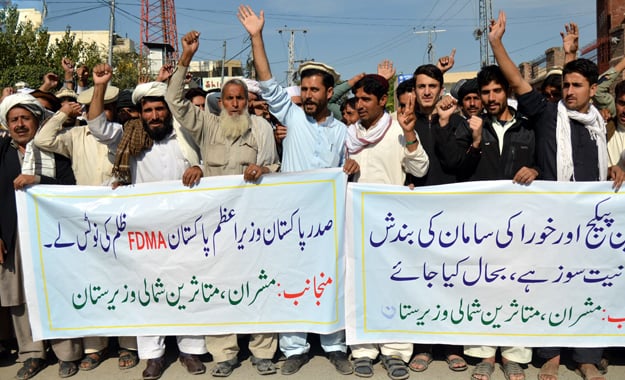
New requirements to physically collect rations instead of sending someone with the relevant CNIC and form have irked the displaced people of the Mehsud tribe. These South Waziristan Agency tribespeople are particularly wary of the fact that women will have to come forward to claim relief items distributed through non-government organisations CRDO and LHO.
For the SWA IDPs, one ration point was set up in Tank and three in DI Khan. Earlier, simply showing a registration form and CNIC of a person was enough to collect relief goods. The affected individual did not need to be physically present at the ration point. If there were any doubts about the person’s identity, a Mehsud committee for the displaced people would run a verification process of their own.
“Personal appearances, especially by women, is problematic and has added our miseries in addition to our parda riwaj,” said Jan Muhammad, a member of the Mehsud IDPs committee. “If someone is ill or settled elsewhere, they have to travel long distances to get their allocated relief items,” he told The Express Tribune.
“There are a lot of other issues such as the reduction of ration and low standards of products,” he pointed out. “Over the last three months, a new condition of personal appearance has added more to our miseries; this condition must be reviewed,” said Jan.

Another displaced person, Shawodad, recalled he lost his home, livestock and house in the war against terrorism. The 55-year-old was in DI Khan with his family’s CNICs to collect relief goods.
“Displaced families collectively asked me to bring back rations from DI Khan to avoid the expense of all of them travelling separately.” His family is temporarily settled in Razmak, North Waziristan. “I was unable to get any rations for those who were not present and ended up spending Rs5,000 for the journey,” he said. “That is more than the actual worth of my personal monthly rations,” he added
Shehryar Mehsud, a journalist familiar with the matter, said Mehsud tribal elders often held jirgas with political administrations and others to find solutions to the issues faced by displaced people. However, the tribespeople received nothing but assurances.
“The problems are so many but it seems they can only be resolved through high-level meetings,” he said. The journalist added solutions to these issues somehow remained in limbo between SAFRON, the federal interior and finance ministries.
However, Said Umar, a FATA Disaster Management Authority official in South Waziristan, argued that many of these claims were exaggerated.
“A close relative can take rations by showing a valid CNIC, but not a distant,” he reiterated. “This is to ensure there is no misappropriation. Great care is taken to ensure that the goods reach deserving people,” he added.
Published in The Express Tribune, November 25th, 2015.

1732530816-0/BeFunky-collage-(88)1732530816-0-165x106.webp)
1720848500-0/Eminem-and-his-daugher-Hallie-(1)1720848500-0-165x106.webp)








COMMENTS
Comments are moderated and generally will be posted if they are on-topic and not abusive.
For more information, please see our Comments FAQ